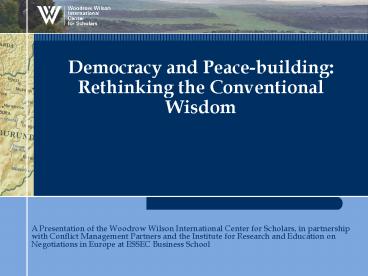Democracy and Peacebuilding: Rethinking the Conventional Wisdom - PowerPoint PPT Presentation
1 / 9
Title:
Democracy and Peacebuilding: Rethinking the Conventional Wisdom
Description:
A Presentation of the Woodrow Wilson International Center for Scholars, in ... combined with legal sanctions, as most effective means of deterring bad behavior ... – PowerPoint PPT presentation
Number of Views:37
Avg rating:3.0/5.0
Title: Democracy and Peacebuilding: Rethinking the Conventional Wisdom
1
Democracy and Peace-buildingRethinking the
Conventional Wisdom
A Presentation of the Woodrow Wilson
International Center for Scholars, in partnership
with Conflict Management Partners and the
Institute for Research and Education on
Negotiations in Europe at ESSEC Business School
2
The Conventional Wisdom
- Assumes principal challenges are rational and
structural get the institutions right, and there
will be stability and security - Rooted in an adversarial paradigm competition
seen as defining characteristic of democracy - Sees moral and political pressure, combined with
legal sanctions, as most effective means of
deterring bad behavior
3
What is Wrong with this Picture?
- Misunderstands Democracy
- Democracy depends not only on competition but on
an underlying set of agreements definition of
the national community, rules of the game, styles
of communication - Democracy depends on cooperation as well as
competition - Democracy depends on sense of common ground among
members of the national community - Political competition is tolerable only when
these underlying conditions are in place
4
What is Wrong with this Picture?
- Neglects Attitudinal Dimension of
- Divided Societies, Mistakes Differences in
- Perceptions for Conflict over Values
- Culturally plural societies often have weak sense
of national identity and community - No recognition of Inter-dependence
- Tendency toward dehumanization of outsiders
5
A New Strategic Perspective The Four Imperatives
of Sustainable Peace and Democracy
- Transform the war-induced, zero-sum paradigm
- Restore trust and rebuild fractured relationships
- Build a new consensus on rules of the game
- Strengthen communication and negotiation skills
6
The Missing Link Building Collaborative Capacity
Among Leaders
- Broadening the notion of capacity building
- Joining skills of trainers with those of
diplomats - Peace-building through leadership training
Burundi, DRC, Liberia, Timor-Leste - Re-defining the role of the international
community
7
Keys to Building Collaborative Capacity (1)
Trainers and Training Methodology
- Experience-based
- Interactive
- Process-centric
- Communications
- Interest-based negotiations
- Analysis of Conflict
- Climate of Mutual Trust
- Building relationships
- Long-term no quick fix
8
Keys to Building Collaborative Capacity (2)
Getting the Right People into the Room
- Entry Points Will Vary from Country to Country
- Importance of national ownership of the process
- Advantages of framing process as technical
capacity building rather than a political
negotiation - Emphasis on inclusivity
- Participants invited in their individual
capacities, not as representatives of their
organizations
9
Conclusions Lessons Learned
- Importance of addressing process and attitudinal
dimensions of post-conflict reconstruction - Holistic approach to peace-building need to
engage key leaders directly in long-term training
program - Must distinguish between technical capacity
and capacity in collaborative decision-making - Need for synergy between efforts of diplomats and
trainers































